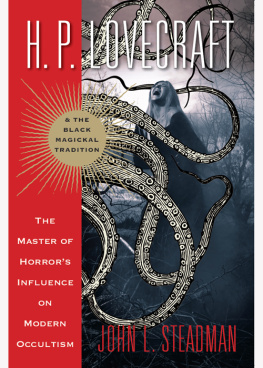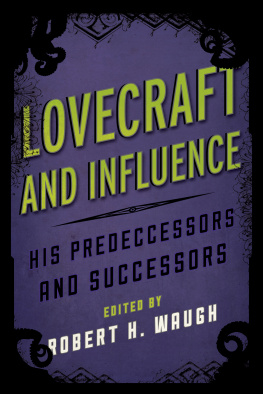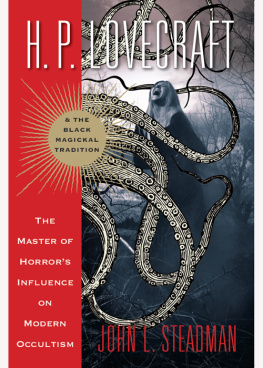Howard Lovecraft - The Transition of Juan Romero
Here you can read online Howard Lovecraft - The Transition of Juan Romero full text of the book (entire story) in english for free. Download pdf and epub, get meaning, cover and reviews about this ebook. genre: Science fiction. Description of the work, (preface) as well as reviews are available. Best literature library LitArk.com created for fans of good reading and offers a wide selection of genres:
Romance novel
Science fiction
Adventure
Detective
Science
History
Home and family
Prose
Art
Politics
Computer
Non-fiction
Religion
Business
Children
Humor
Choose a favorite category and find really read worthwhile books. Enjoy immersion in the world of imagination, feel the emotions of the characters or learn something new for yourself, make an fascinating discovery.

- Book:The Transition of Juan Romero
- Author:
- Genre:
- Rating:3 / 5
- Favourites:Add to favourites
- Your mark:
- 60
- 1
- 2
- 3
- 4
- 5
The Transition of Juan Romero: summary, description and annotation
We offer to read an annotation, description, summary or preface (depends on what the author of the book "The Transition of Juan Romero" wrote himself). If you haven't found the necessary information about the book — write in the comments, we will try to find it.
The Transition of Juan Romero — read online for free the complete book (whole text) full work
Below is the text of the book, divided by pages. System saving the place of the last page read, allows you to conveniently read the book "The Transition of Juan Romero" online for free, without having to search again every time where you left off. Put a bookmark, and you can go to the page where you finished reading at any time.
Font size:
Interval:
Bookmark:
The Transition of Juan Romero
by Howard Phillips Lovecraft
Of the events which took place at the Norton Mine on October eighteenth and nineteenth, 1894, I have no desire to speak. A sense of duty to science is all that impels me to recall, in the last years of my life, scenes and happenings fraught with a terror doubly acute because I cannot wholly define it. But I believe that before I die I should tell what I know of the shall I say transition of Juan Romero.
My name and origin need not be related to posterity; in fact, I fancy it is better that they should not be, for when a man suddenly migrates to the States or the Colonies, he leaves his past behind him. Besides, what I once was is not in the least relevant to my narrative; save perhaps the fact that during my service in India I was more at home amongst white-bearded native teachers than amongst my brother-officers. I had delved not a little into odd Eastern lore when overtaken by the calamities which brought about my new life in America's vast West a life wherein I found it well to accept a name my present one which is very common and carries no meaning.
In the summer and autumn of 1894 I dwelt in the drear expanses of the Cactus Mountains , employed as a common labourer at the celebrated Norton Mine, whose discovery by an aged prospector some years before had turned the surrounding region from a nearly unpeopled waste to a seething cauldron of sordid life. A cavern of gold, lying deep beneath a mountain lake, had enriched its venerable finder beyond his wildest dreams, and now formed the seat of extensive tunneling operations on the part of the corporation to which it had finally been sold. Additional grottoes had been found, and the yield of yellow metal was exceedingly great; so that a mighty and heterogeneous army of miners toiled day and night in the numerous passages and rock hollows. The Superintendent, a Mr. Arthur, often discussed the singularity of the local geological formations; speculating on the probable extent of the chain of caves, and estimating the future of the titanic mining enterprises. He considered the auriferous cavities the result of the action of water, and believed the last of them would soon be opened.
It was not long after my arrival and employment that Juan Romero came to the Norton Mine. One of the large herd of unkempt Mexicans attracted thither from the neighbouring country, he at first attracted attention only because of his features; which though plainly of the Red Indian type, were yet remarkable for their light colour and refined conformation, being vastly unlike those of the average "greaser" or Piute of the locality. It is curious that although he differed so widely from the mass of Hispanicised and tribal Indians, Romero gave not the least impression of Caucasian blood. It was not the Castilian conquistador or the American pioneer, but the ancient and noble Aztec, whom imagination called to view when the silent peon would rise in the early morning and gaze in fascination at the sun as it crept above the eastern hills, meanwhile stretching out his arms to the orb as if in the performance of some rite whose nature he did not himself comprehend. But save for his face, Romero was not in any way suggestive of nobility. Ignorant and dirty, he was at home amongst the other brown-skinned Mexicans; having come (so I was afterward told) from the very lowest sort of surroundings. He had been found as a child in a crude mountain hut, the only survivor of an epidemic which had stalked lethally by. Near the hut, close to a rather unusual rock fissure, had lain two skeletons, newly picked by vultures, and presumably forming the sole remains of his parents. No one recalled their identity, and they were soon forgotten by the many. Indeed, the crumbling of the adobe hut and the closing of the rock-fissure by a subsequent avalanche had helped to efface even the scene from recollection. Reared by a Mexican cattle-thief who had given him his name, Juan differed little from his fellows.
The attachment which Romero manifested toward me was undoubtedly commenced through the quaint and ancient Hindoo ring which I wore when not engaged in active labour. Of its nature, and manner of coming into my possession, I cannot speak. It was my last link with a chapter of my life forever closed, and I valued it highly. Soon I observed that the odd-looking Mexican was likewise interested; eyeing it with an expression that banished all suspicion of mere covetousness. Its hoary hieroglyphs seemed to stir some faint recollection in his untutored but active mind, though he could not possibly have beheld their like before. Within a few weeks after his advent, Romero was like a faithful servant to me; this notwithstanding the fact that I was myself but an ordinary miner. Our conversation was necessarily limited. He knew but a few words of English, while I found my Oxonian Spanish was something quite different from the patois of the peon of New Spain.
The event which I am about to relate was unheralded by long premonitions. Though the man Romero had interested me, and though my ring had affected him peculiarly, I think that neither of us had any expectation of what was to follow when the great blast was set off. Geological considerations had dictated an extension of the mine directly downward from the deepest part of the subterranean area; and the belief of the Superintendent that only solid rock would be encountered, had led to the placing of a prodigious charge of dynamite. With this work Romero and I were not connected, wherefore our first knowledge of extraordinary conditions came from others. The charge, heavier perhaps than had been estimated, had seemed to shake the entire mountain. Windows in shanties on the slope outside were shattered by the shock, whilst miners throughout the nearer passages were knocked from their feet. Jewel Lake, which lay above the scene of action, heaved as in a tempest. Upon investigation it was seen that a new abyss yawned indefinitely below the seat of the blast; an abyss so monstrous that no handy line might fathom it, nor any lamp illuminate it. Baffled, the excavators sought a conference with the Superintendent, who ordered great lengths of rope to be taken to the pit, and spliced and lowered without cessation till a bottom might be discovered.
Shortly afterward the pale-faced workmen apprised the Superintendent of their failure. Firmly though respectfully, they signified their refusal to revisit the chasm or indeed to work further in the mine until it might be sealed. Something beyond their experience was evidently confronting them, for so far as they could ascertain, the void below was infinite. The Superintendent did not reproach them. Instead, he pondered deeply, and made plans for the following day. The night shift did not go on that evening.
At two in the morning a lone coyote on the mountain began to howl dismally. From somewhere within the works a dog barked an answer; either to the coyote or to something else. A storm was gathering around the peaks of the range, and weirdly shaped clouds scudded horribly across the blurred patch of celestial light which marked a gibbous moon's attempts to shine through many layers of cirro-stratus vapours. It was Romero's voice, coming from the bunk above, that awakened me, a voice excited and tense with some vague expectation I could not understand:
" Madre de Dios ! el sonido ese sonido oiga Vd! lo oye Vd? seor, THAT SOUND!"
I listened, wondering what sound he meant. The coyote, the dog, the storm, all were audible; the last named now gaining ascendancy as the wind shrieked more and more frantically. Flashes of lightning were visible through the bunk-house window. I questioned the nervous Mexican, repeating the sounds I had heard:
"El coyote el perro el viento?"
But Romero did not reply. Then he commenced whispering as in awe:
Font size:
Interval:
Bookmark:
Similar books «The Transition of Juan Romero»
Look at similar books to The Transition of Juan Romero. We have selected literature similar in name and meaning in the hope of providing readers with more options to find new, interesting, not yet read works.
Discussion, reviews of the book The Transition of Juan Romero and just readers' own opinions. Leave your comments, write what you think about the work, its meaning or the main characters. Specify what exactly you liked and what you didn't like, and why you think so.




